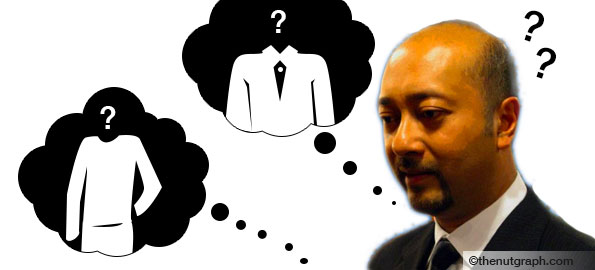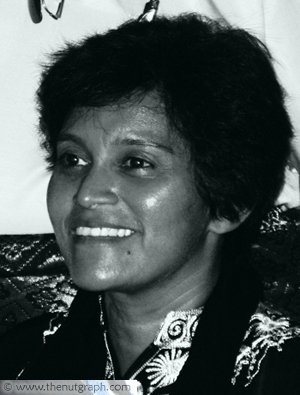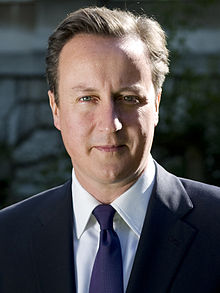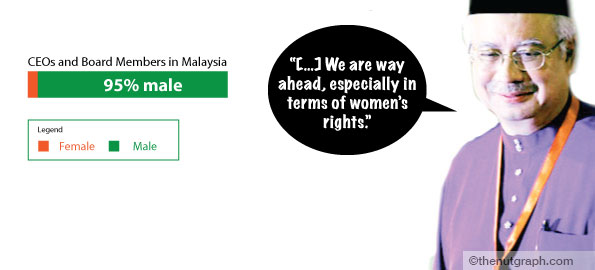THE sexist remarks against the DAP candidate for the Teluk Intan by-election Dyana Sofya Mohd Daud are well documented. Home Minister Datuk Seri Abdul Zahid Hamidi advised police not to vote for her because she’s “not that pretty”. Kedah Menteri Besar Datuk Seri Mukhriz Mahathir claimed to be confused about her image because she was dressed differently in different campaign posters. And Wanita Umno chief Datuk Seri Shahrizat Abdul Jalil said Dyana Sofya was being used by the DAP, hence intimating that the younger politician did not have the agency to think for herself. Pakatan Rakyat politicians too demonstrated sexism and misogyny during the Teluk Intan campaign.

Despite ratifying the Convention on the Elimination of Discrimination Against Women (Cedaw) nearly 20 years ago in 1995, our leaders still seem clueless about sexism in politics. Prime Minister Datuk Seri Najib Razak even proclaimed in 2012 that there was no need for women’s rights groups in Malaysia as women already had equality “from the start”.
How was the sexism displayed against Dyana Sofya bigger than just her candidacy and political career? And what does the government need to do to combat such attitudes especially since it has an international obligation to do so?
Substantive equality
It appears that leaders such as Najib think that equality between men and women simply involves our laws treating them equally. In Najib’s 2012 statement, he cited women having the right to vote “from the start” as evidence of this equality. But this is merely formal equality. De facto equality, or substantive equality, goes beyond laws. Substantive equality takes into account the circumstances in which those laws operate. For instance, if it is a cultural norm for boys to attend school, while girls are kept at home, having laws that guarantee the same university admission criteria for both sexes does not ensure substantive equality. Or the law may not prohibit women from attending university. But if in the area, there is a high degree of crime against women, including sexual crimes, then in reality, women do not have equal access to university as men do.
Looking at substantive equality, and not just formal equality, helps to explain why there are fewer women holding political office and positions of leadership in public life. In Malaysia, for instance, women constitute only 23 out of 222 members of Parliament. Only 47.9% of women were in the workforce in 2012, below the average in East Asia and Pacific countries. And women make up only five to six percent of CEOs and board members in the country. This is despite the fact that women graduates outnumber their male counterparts, making up 68% of public university entrants in the 2013/14 intake.
Many, from politicians to academics, have highlighted the cultural obstacles that women politicians face. These obstacles stem from pervasive ideas that a woman’s place is at home and that they are politically inferior to men. Examples of this societal discrimination abound. Umno’s Datuk Bung Mokhtar Radin referred disparagingly to women’s menstruation with his “bocor” remarks addressed at then fellow Member of Parliament (MP) Fong Po Kuan. Selangor Speaker Hannah Yeoh and Kulai MP Teo Nie Ching have been accused of not being able to carry out their political roles adequately because they are mothers to young children.

At the other end of the spectrum, Pengerang MP Datuk Seri Azalina Othman and Seputeh MP Teresa Kok face challenges as single women politicians. Azalina has said that there “is an expectation to get married, especially as a Malay politician”. Meanwhile, Kok was told not to comment on issues relating to single mothers because she is unmarried.
Such obstacles are in addition to the ones women already face when joining the workforce. These include the lack of basic facilities such as work-based childcare centres or adequate support for breastfeeding women.
Setting things right
What then needs to be done to ensure substantive equality for women politicians, and for all women?
1. Stop it
Our government and all politicians need to stop discriminating against women politicians. Malaysia’s government has promised, in Cedaw’s Article 2(d) to “refrain from engaging in any act or practice of discrimination against women.” It has also committed to ensuring “that public authorities and institutions shall act in conformity with this regulation.”
If cultural attitudes are to change, Malaysia’s leadership must condemn and counter discriminatory language and behaviour instead of normalising it. Having regulations that bar sexist remarks in Parliament is a good start. But that alone isn’t enough if there is silence when politicians make discriminatory remarks such as those targeted at Dyana Sofya or women MPs in Parliament. When Umno leaders such as Zahid and Mukhriz made the kind of remarks they made about Dyana Sofya, Najib himself should have denounced them. That he didn’t raises the question of how serious Malaysia’s commitment is to its international covenant obligations.

Additionally, a comparison between Najib and UK Prime Minister David Cameron provides us with proof that it is possible for a country’s leader to take a tough stance on sexism.
When commenting on sexist e-mails sent by Premier League chief executive Richard Scudamore, Cameron said if any Cabinet minister had made such remarks, he would have sacked them. This is right and fitting as politicians who do not believe in equality between men and women should be sacked from Cabinet and not be selected to stand as parliamentary or state assembly candidates.
2. Better representation
In advocating for better representation of women in public office, the Women’s Aid Organisation has pointed to a study on a law in India which reserves places for women chief councillors. The study found that “repeated exposure to female leaders changed villagers’ belief on female leader effectiveness and reduced their association of women with domestic activities.”
To normalise women’s participation in politics, the government needs to consider reserving at least one-third of Parliamentary and state assembly seats for women representatives. Many countries have adopted such quotas, from our Asean neighbours Indonesia and the Philippines to Mexico, South Africa and France. This is in line with Cedaw’s Article 4 which mandates state parties to adopt “temporary special measures” to accelerate de facto equality between men and women.
These measures are not meant to privilege women or give them permanent special status. Instead they are meant to acknowledge the disadvantageous position that women begin with when wanting to attain political office, because of negative cultural perceptions and stereotypical attitudes. Such measures can be discontinued when substantive equality has been achieved.
3. Acknowledge discrimination
Our government has to start acknowledging that discrimination against women in Malaysia exists and is in fact, perpetuated by government ministers themselves. Only then can they meaningfully address the substantive inequalities that exist in society. The numbers and statistics on women’s participation in public life speak for themselves and belie any assertion that women’s rights do not need defending in Malaysia.

Beyond Dyana
The sexist remarks about and attitudes towards Dyana Sofya are not just about her, just as earlier remarks about other women politicians were not just about them. These remarks and the silence and lack of action from the nation’s top leaders reflect deep-seated notions about women and how much they are valued compared to men.
These remarks and attitudes make it unpalatable and unsafe for women to enter into public life, whether as professionals or politicians. And that means it becomes unsafe and not conducive for other women, too, and not just Dyana Sofya.
Ultimately, fighting for women’s equality is not about discriminating against men. It is about ensuring that women are valued just as much as men. What’s clear is that in Malaysia, our top political leaders don’t believe women deserve to be valued as highly as men. If they did, they would have long ago done what was needed to stop the sexist remarks against women like Dyana Sofya.![]()
Ding Jo-Ann believes that women’s rights are human rights.


Anon says
Problem is, many women themselves support discrimination towards women and what’s worst is that they don’t even realize it.
The way we live the religion in Malaysia clearly says that the men are king. Not in a directive way but you know what I mean.. (We must obey.. no rejection on sex.. etc..)
Question is, how to wake up women in Malaysia to fight for equality?